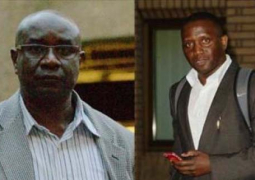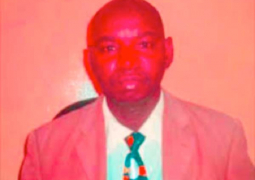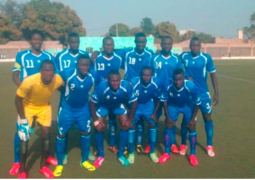
In an unprecedented move and for the first time in the history of the Gambian media, President Yahya Jammeh yesterday held a meeting with members of the press, in particular those from the independent press, as part of efforts to build good and better relations between Government and the independent press.
The meeting, held at State House in Banjul, brought together media chiefs and their editors with cabinet members with the sole objective of trashing out any misunderstanding between the state and the independent press.
It, among others, availed Gambian media chiefs, as well as the Executive, the opportunity to raise and address pressing issues, and bring about wider understanding between the two sides.
Speaking at the meeting, President Yahya Jammeh emphasized the importance of the press, stressing that the press has a positive role to play in national development, the peace and stability of any country.
However, he stated that he will not compromise or sacrifice the peace, security, stability, dignity and the well-being of Gambians for the sake of freedom of expression.
“I want that to be very clear. You can say whatever you want to say. Yes, there is freedom of expression, but there is also freedom to defend the interest of this country. Each of us has a role to play and, as long as you play your role correctly and does not endanger the livelihood of Gambians, we will be friends".
“But I will not allow anybody who wants to endanger the peace and stability of this country because, in doing so, you are asking for trouble,” he added.
According to him, stories have been going round that the Gambia Government does not normally talk to the independent press; that information is not available and that, sometimes, the impression given is that public servants are not obliged to talk to the press.
“And when comments like that are made, the fingers are pointed higher up. Let me make my position very clear. I am here for the interest of the country; the interest of every Gambian. I am here for the peace and stability of this country, so that all of us will enjoy life; all of us will realize our dreams, and all of us will have the chance to pray to the Almighty Allah".
“My government’s role is to make this country better, making the people of this country live better, peaceful and rewarding lives. My heart is a very small heart, and it does not have enough space to accommodate hatred. My heart is full with love for humanity, and the love for this country.
“Yes, I am the President; I am answerable to the Gambian people for my actions, but more importantly than that, I am answerable to the Almighty Allah, who is the supreme authority. I am not answerable to the West. I am not answerable to the East; I’m not accountable to the West. I am accountable to the Gambian people, and to the Almighty Allah,” he added.
President Jammeh emphasized that he will never sacrifice the peace, security and stability of this country on the altar of freedom of expression.
“I am making this very clear. You can write what you want, and I do what I want for the interest of the Gambian people. I’m not hostile to anyone of you. When you cross the line, and offend me, I resort to the law by taking you to court.
“I have no hatred for anyone of you, but I will not compromise national security. The peace and stability of this country, I will never compromise. So, what will I gain by harassing the press? I always make it very clear, from 1994 to date, that whatever I do, write it, but if you write what I didn’t do, I will deal with you, and I will deal with you whether the West or the East likes it or not, even if the sky is going to explode.
“Because am the President doesn’t mean that I can trample on anybody’s rights or go about beating up people. No, but also because you are a journalist does not mean that you can write whatever you want to write, knowing that it is not true,” he stated.
The Gambian leader further stated that the only power that he knew, and is afraid of, is the Almighty Allah. That the only person he is afraid of is the person he offended, because Allah does not want people who offend.
“Most people believe that the press, when you talk to them, then they say public officials are not allowed to talk to them. Let me make it very clear that my government has no law that says that public officials cannot talk to the press. There is no law in place that prevents public officials from talking to the press. I want that to be very clear. When they tell you that they have not been allowed to talk to them, tell them to put it in writing, and ask them who tells them that they should not talk to you.
“If I think that the whole government is APRC, I’m making a great mistake. And if I also expect all of you to like me, then I’m sick. Any individual, and even dead bodies, have enemies because some will say good things about dead bodies, and some will say bad things about them. Who am I, Yahya Jammeh, to expect that everybody should love me and who ever doesn’t love me I should lock him up or kill him?
“From 1994 to date, we have people that have been sentenced to death for killing soldiers in Farafenni and Kartong and are still in death row. There is no power or authority in this world that I am afraid of that prevented me from implementing the sentence against them. But the image portrayed that Yahya Jammeh is a monster, is a dictator, is a killer, and that The Gambia is not a place for journalists; how many people have been killed in this country? If I was a monster, I would have been killing a lot of people when we just came in, but that’s not what I believe in,” he remarked.
He went on to note that there is law in this country. “If I want to say that, I am the President, and I will take the law into my own hands, then I am subverting the rule of law, I’m bringing about the law of the jungle, which I will not do. I want to make it very clear that anybody who is killed in this country or is sentenced to death, if I have to sign the death warrant, I will.
“Am I afraid of any Western power? No, am not, because no Western power is feeding me. I see no reason why I should be afraid of executing people that have killed soldiers or have been sentenced to death by a court of law, and then go and kill a journalist.
“Interestingly enough, those people that are tutors of freedom of expression are the same people in whose countries you can insult the Prophet (PBUH), and get away with it because that is freedom of expression; and you go to jail for denying the holocaust,” he asserted.
Swaebou Conateh, publisher of the Gambia News and Report Magazine, stated that relations between the Government and press could not have been worst than now. However, he noted, it is not too late to adjust or readjust the position, so that the Gambia can, among its many achievements under the Jammeh administration, boast of having the most free press in Africa, if not in the whole world.
He, among others, highlighted the detentions, prosecutions that have taken place and the mysterious killings and disappearance of journalists in the country.
He expressed the need for government to look into the issue of decriminalizing speech and consider repealing draconian medial laws, which, according to him, are out of step with the information age.
Conateh further expressed gratitude for the enabling environment created by government that led to the proliferation of radio stations in the country. He also called on government to create the platform for regular press briefings.
Pap Saine, Managing Director and co-publisher of The Point newspaper underscored the importance of having a good and cordial relationship between the government and the press.
According to him, it is paramount that the independent press has access to government news, “so that we can effectively contribute our quota to the dissemination of information about what the government is doing and saying, etc. for the benefit of the general public, and our readers, at home and abroad.
“We want to make our position very clear that we are not an enemy to the state, as many people perceive us in certain quarters. The journalist does not see himself or herself in that role. We are neither backers of, nor the opposition. Our job requires us to report on both the pleasant and the sordid aspects of society,” he further stated.
In his view, “we live in a society that has people with divergent views and dissenting opinions and, quite naturally, the media is expected to be pluralistic.
“We do not want to be seen as enemies, but as partners in development. We are simply contributing our quota to nation-building,” Saine pointed out.
Sam Sarr, Editor of Foroyaa newspaper, welcomed the move and expressed hope that this marks the beginning of fruitful discussions between the media and the Executive.
According to him, the Executive has a role and function, but the media also has its role and its functions, and the role of the media is clearly defined in the constitution.
“I am interested in knowing the position of the Executive on this issue. The President has spoken his mind, but I am interested in knowing the position of the government regarding this constitutional provision, which states that the press and other information media shall at all times be free to uphold the principal provisions and objectives of this constitution, and the responsibility and accountability of the Gambia government to the people of The Gambia,” he said, adding that as far as Foroyaa is concerned, this serves as their guiding principle.
He noted that governments have to be kept on their toes in order to assist them to become more effective, and also to avoid certain wrong doings and errors that may be created in the process of governance.
Also speaking at the meeting was the Vice President and minister for Women’s Affairs, Aja Dr Isatou Njie-Saidy, who underscored the need for capacity building and institutional strengthening, as well as responsible reporting by journalists.
She called on journalists to verify their facts before reporting, noting journalists should also talk about developments that have taken place in this country since 1994 to date, and say the positive developments about good governance, democracy and human rights.
“A lot of progress has been registered in this country, and that should be commended,” she added.
According to her, journalists should admit the fact that the country has seen the proliferation of so many radio stations in this country, adding that when this is done, government will be convinced that there is a balance in reporting.
“Say what we have done bad, but also say what we have done good,” she declared.
Read our tomorrow’s issue for more details about the meeting of the President with the press.




